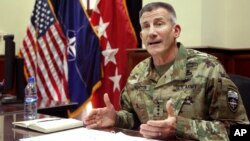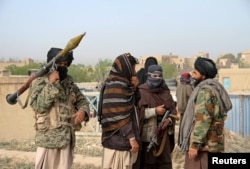The Afghan Senate on Monday said it will investigate growing military ties between Taliban insurgents and Iran and Russia.
"Evidence of Russian and Iranian cooperation with the Taliban has been found," Fazal Hadi Muslimyar, chairman of the Afghan Senate said. He added that reports of foreign links to the Taliban are "worrisome."
The probe comes after U.S. General John Nicholson, leader of NATO's Resolute Support Afghan mission, said over the weekend that Taliban connections to Russia and Iran are not advancing the cause of stability in the region.
Taliban living in Iran
Moscow is allegedly helping and arming the Taliban in a bid to contain the influence of Islamic State affiliates in Afghanistan and prevent it from threatening neighboring central Asian states.
And Iran is accused by Afghan officials of harboring Taliban fighters from Afghanistan in cross-border areas.
“Families of a number of high ranking Taliban leaders reside in Iran,” Asif Nang, the governor of western Farah province, recently told Radio Liberty. “They live in cities such as Yazd, Kerman, and Mashhad, and come back to Afghanistan for subversive activities.”
The governor said bodies of Taliban fighters who were killed in recent clashes in the provincial capital have been transported to their families in Iran. Nang told Afghan media that over 5,000 Taliban militants are present in the province.
High-grade weapons for Taliban
Locals say they often see Taliban crossing borders into Iran.
“More new faces are seen these days coming from Afghanistan,” Jamaluddin, an Afghan refugee in Taybad city which lies close to the border with Afghanistan, told VOA. “They are barely seen in public places as they try to keep themselves away from other Afghans. Some Afghans say they are Taliban members.”
Afghan lawmakers say Tehran is also supplying sophisticated weapons to the Taliban.
“Iran not only has hosted Taliban families, it has supplied the group with weapons that could target and damage tanks and planes,” lawmaker Jumadin Gayanwal from southeastern Paktika province said.
Iran says reports are "baseless"
Iran has denied the accusations, saying it has close relations with the government of Afghanistan.
“The reports about the presence of Taliban elements in Iran is baseless,” said Behram Qasemi, a spokesperson of the Iranian foreign office. He added that Iran has “brotherly relations” with Kabul, based on mutual interests.
Iran considered the Taliban movement a major ideological threat when it first emerged in the mid-1990s. But Tehran's views of the group has changed considerably since 2001.
“Despite being each other's arch enemy in the 1990s, Tehran did not hesitate to provide the Taliban with ammunitions and explosives aimed at preventing U.S. troops from being able to use Afghanistan as a base to attack Iran,” said Fatemeh Aman, an Iran-South Asia affairs analyst based in the U.S.
Russia in search of peace
Helped by Iran and Tajikistan, Moscow too is furthering contacts with the insurgent group, analysts say.
Russian President Vladimir Putin's special envoy to Afghanistan, Zamir Kabulov, told Turkey's Anadolu agency recently that Moscow has been in contact with Taliban leaders to promote stalled peace talks between the Taliban and the Afghan government.
“We have contacts with the Taliban … to end the war by a national cease-fire,” Kabulov said. And Moscow too is concerned about the growing IS threat in Afghanistan, Kabulov added.
“The Taliban are fighting in Afghanistan against the people we fought in Syria, that's why our interests coincide,” he said.
Afghan leaders wary of Russia
But Afghan lawmakers say Russia's meddling is not welcome. Russia fought a war in Afghanistan from 1979 to 1989 and its current ties to Taliban's growing Afghan insurgency are troubling, they say.
“Any sort of relations with and supporting groups which terrorize Afghan people would become a regional threat in the long term, and no country will be spared from its danger,” Shakib Mustaghni, a spokesperson for the Afghan Foreign Ministry told Radio Liberty.
VOA's Mehdi Jedinia contributed to this report from Washington.





